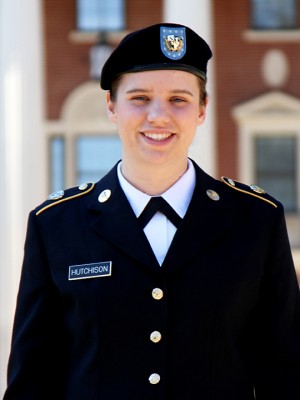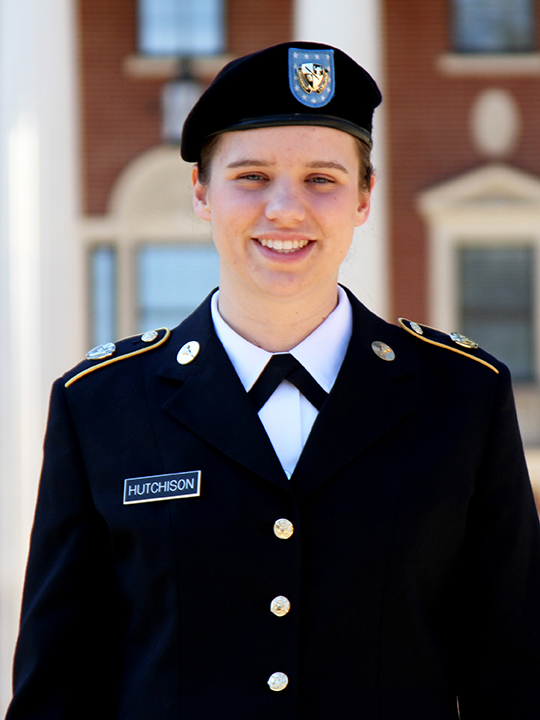
By Kara Blomquist
Reporter
A Baylor student was the first to conduct a research study on the subject of military venous thromboembolisms (VTEs) that considered 10 years of data.
“VTEs had not been looked at in the military population,” said New Braunfels sophomore Tara Hutchison, the student who conducted the research.
This was the first study of military VTEs that took place over such a large time period.
Injured military personnel are six times more likely to suffer from venous thromboembolisms, blood clots located in veins, than those injured in the general population, based on studies of military personnel injured in Iraq and Afghanistan between 2001 and 2011.
These clots, which can result from wounds, injuries and other conditions, are excruciatingly painful and dangerous.
The clots not only cause the patients extreme suffering but can lead to death.
Hutchison is conducting research to find ways to prevent these clots from occurring in military members.
This research is still in its early stages and she is still working on setting up the parameters for her analysis, Hutchinson said.
She said she is currently determining which patients to include in her analysis. She is considering limiting her data to those military members admitted to only one military hospital.
Hutchison conducted research in the summer of 2012.
She conducted an analysis using the Joint Theater Trauma Registry, a database containing records of all military personnel admitted to a military hospital, and ran statistical tests comparing the patients who developed a VTE with those who didn’t.
Hutchison, a cadet in the Baylor Army ROTC, conducted the study through a research fellowship with Lt. Col. Christopher White, M.D., at the San Antonio Military Medical Center in the summer of 2012.
Hutchison found that military patients with amputations were more likely to have these clots.
Venous thromboembolism includes pulmonary embolisms, blood clots in the lungs and deep vein thrombosis, blood clots in a deep vein.
“The pulmonary embolism is a more serious disease that’s more likely to kill you,” she said.
Hutchison then focused her research on the more dangerous blood clots in the lungs.
She ran another statistical analysis using data of military personnel with amputations and found that multiple amputations and leg amputations above the knee made soldiers more likely to fall victim to the painful clots in the lungs.
Hutchison said she hopes the results of her study make doctors more attuned to the risks amputees face.
“I want the doctors to be more aware that the amputees are more likely to develop a VTE,” she said. “They’re the population that should be more closely watched.”
Maj. Santos Arroyo, assistant professor of military science at Baylor, said he has high hopes for Hutchison’s research.
“It’s hard to keep continuity of care, at least in my experience, and having this data and this research probably will help with that continuity for veterans,” he said.
Arroyo said this common knowledge about venous thromboembolisms could make the care found at the various military hospitals become even more uniform.
Hutchison presented her research at the Academic Surgical Congress on Feb. 7 in New Orleans. She said she was the only undergraduate student at the meeting.
“That was actually the first time, besides when I just presented to groups of doctors at the San Antonio Military Medical Center, that my research was made public,” she said.
Hutchison said she enjoys working on the project.
“I really liked this one because it was my own project, my own baby,” she said. “I could figure out all the statistical tests and answer questions from it.”
Hutchison said she would like to use this research in her future career. She said she wants to be a trauma surgeon in the military.
“It’s definitely a topic that I’ve taken a loving to and would love to continue to do, answer multiple questions on it and really become the expert in the field,” she said, “so that when I get practicing I’ll know more about it and people will be able to ask me questions.”
Three Rivers junior Jacob Moran, president of Baylor’s Medical Service Organization, met Hutchison in the fall of 2011.
He was a community leader in Kokernot while she was living in the residence hall. He also went on a mission trip to Belize with Hutchison in the spring of 2011 with the Medical Service Organization. He said he realizes Hutchison’s passion for her research.
“I know that she’s been working on it for a really long time,” he said. “And so I know that she’s really dedicated to it, and she really knows a lot about it, which is really neat.”
Hutchison said she hopes to be stationed at San Antonio Military Medical Center.
“Just from my research fellowship at the San Antonio Military Medical Center, I absolutely love it,” she said. “Hopefully, one day I will be stationed there and be able to be a trauma surgeon and continue to research also.”






